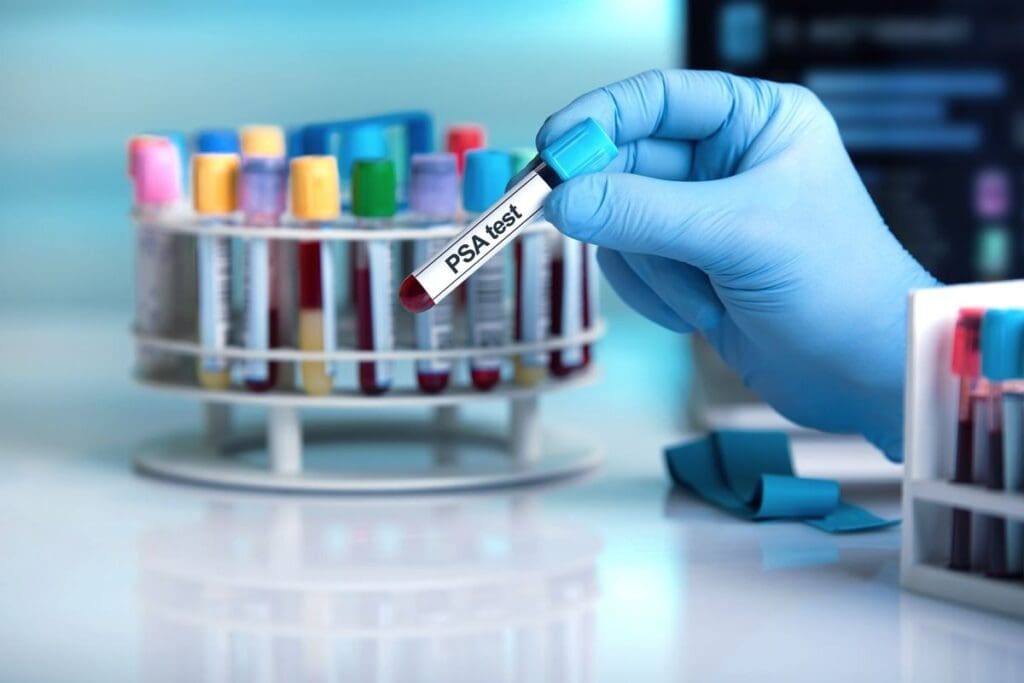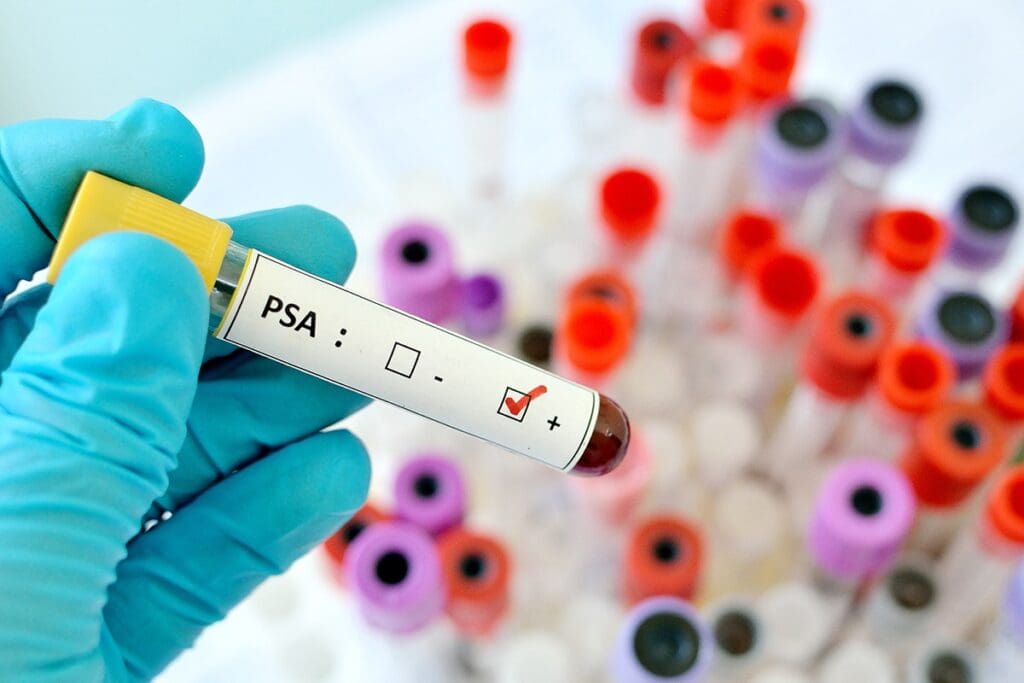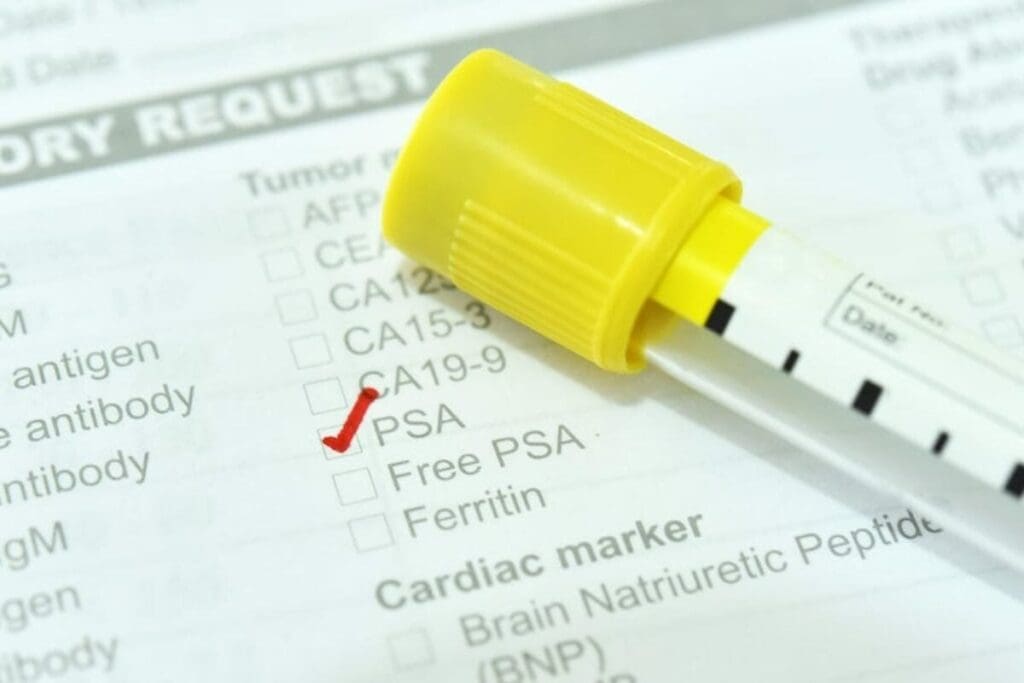Last Updated on October 31, 2025 by

Many medications can affect blood test prostate PSA levels, which may change how well prostate cancer is screened. Prostate-Specific Antigen (PSA) is a protein produced by the prostate gland and is used to monitor prostate health and detect cancer.
It’s important to understand how certain medicines can alter PSA levels. Some can lower them, hiding potential issues, while others can raise them without a serious cause. Knowing these effects helps doctors make accurate diagnoses and treatment decisions.
By learning how different drugs impact PSA levels, patients and doctors can work together for better prostate health management.
The prostate-specific antigen (PSA) test is a blood test used to detect signs of prostate conditions. It’s a key tool in monitoring prostate health. PSA is a protein made by the prostate gland, and its levels help assess prostate health.
PSA is a protein made by both normal and cancerous prostate cells. A high PSA level can indicate prostate issues, like benign prostatic hyperplasia (BPH), prostatitis, and prostate cancer. It’s vital for men, and those at risk of prostate cancer, to understand PSA and its implications.
We use the PSA test as a first step to find possible prostate problems. A high PSA reading doesn’t always mean cancer. But, it does mean we need to look closer.
PSA levels change with age, and what’s normal varies among individuals. Younger men usually have lower PSA levels. Older men might have slightly higher levels because their prostate gland grows.
Regular PSA testing can help find prostate issues early, which can improve treatment outcomes. Early detection is key to managing prostate health effectively. By watching PSA levels over time, doctors can spot changes that might mean a problem. This allows for early action.

It’s important to know what can raise PSA levels. Certain medications can affect PSA levels. We’ll look at these factors next, giving a full view of how to understand PSA test results.
Medications can change PSA test results, which is why knowing these effects is key. PSA tests help check prostate health. But, some drugs can change PSA levels, making diagnosis harder.
Many drugs can change how much PSA is made. For example, testosterone replacement therapy and anabolic steroids might raise PSA levels. On the other hand, nonsteroidal anti-inflammatory drugs (NSAIDs) and statins could lower them. Knowing how these drugs affect PSA is important for correct test results.
Some important things to remember:
Medications can make it harder to diagnose prostate problems. For instance, a patient on testosterone therapy might have higher PSA levels. This could be mistaken for prostate cancer. On the other hand, drugs that lower PSA might hide real issues, leading to late diagnosis.
To get around these issues, it’s important to tell your doctor about all your medications.
Telling your doctor about all your medications is vital. This includes supplements and over-the-counter drugs. It helps doctors:
By knowing how medications affect PSA and talking openly with doctors, patients can get more accurate diagnoses and better treatment plans.

PSA levels can change due to different medications. It’s important to know how these changes affect prostate health. Some drugs can make PSA levels go up, which might make it harder to diagnose prostate problems.
Testosterone replacement therapy (TRT) can affect PSA levels. Research shows that men on TRT might see changes in their PSA levels. This is a concern for prostate cancer screening.
According to a study in PubMed Central, it’s key for men and their doctors to understand how TRT impacts PSA levels.
Anabolic steroids, used by athletes and bodybuilders, can also raise PSA levels. These substances can harm prostate health, leading to higher PSA readings. People using these substances should know the risks to their prostate.
Corticosteroids, like betamethasone, are used for their anti-inflammatory effects. But, they can also affect PSA levels. Men taking corticosteroids should talk to their doctor about their prostate health.
Many prescription drugs can change PSA levels. It’s important for men to tell their doctors about all medications they’re taking. This helps ensure PSA test results are accurate. It also helps discuss any risks and how they might affect prostate cancer screening.
Knowing which medications can raise PSA levels is key for accurate prostate cancer screening. By understanding these factors, men and their doctors can make better decisions about prostate health.
The FDA has found a list of drugs that can raise PSA levels. This is important for men getting prostate cancer screenings. Some drugs can affect PSA test results.
The FDA Adverse Event Reporting System (FAERS) helps find drug side effects. It shows which drugs can raise PSA levels. This is key for doctors to understand PSA test results.
There are 22 medications linked to higher PSA levels. These drugs are in many categories, showing how complex drug effects on prostate health can be.
Many types of drugs can raise PSA levels. Some include:
Knowing these categories is key for managing prostate health.
PSA increases can vary a lot. Some men see a small, short increase, while others see a big, long one.
Men on these drugs should talk to their doctor about PSA tests. Adjusting test timing or understanding medication effects can help with accurate screening.
Knowing which drugs raise PSA helps us get better diagnoses and treatments for prostate health.
Some medicines can lower PSA levels, which is key for prostate health checks. Knowing how these drugs work helps men and doctors make better choices for prostate care.
NSAIDs help with pain and swelling. Long-term use can lower PSA levels. This might change how PSA test results are seen.
For example, men on NSAIDs might have PSA levels that seem lower than they really are. This could hide a problem.
Statins are for lowering cholesterol and heart disease risk. Research shows statins can also lower PSA levels. It’s not clear how, but it might affect how PSA is made or removed.
Thiazide diuretics help with high blood pressure and other issues. Some studies suggest they might lower PSA levels too. But how much they affect PSA can vary, and more study is needed.
Many men take several medicines at once. This can make PSA levels drop more than one medicine alone. It’s important to know how all these medicines work together.
Men should talk to their doctor about all their medicines before a PSA test. This way, their test results will be accurate, and any needed actions can be taken.
Talking to your doctor about your medications is key to getting right PSA test results. Before a PSA test, it’s important to discuss your current medications with your healthcare provider.
To get accurate PSA test results, make a detailed list of all your medications. This includes prescription drugs, over-the-counter drugs, and supplements. Your list should have:
The timing of your PSA test is very important. Some medications may need to be paused or adjusted before testing to get accurate results. Your doctor will tell you the best time based on your medications.
Your medication history affects how your PSA results are seen. For example, finasteride or dutasteride can lower PSA levels. This might hide high readings. Your doctor must look at your medication history when reading your PSA test results.
If you’ve changed your medications, your doctor might suggest more PSA testing. This is true if you’re on drugs that can change PSA levels.
By talking closely with your healthcare provider and sharing your medication info, you can get accurate PSA test results. This helps give a clear view of your prostate health.
It’s very important to keep an eye on PSA levels when taking medicine. Knowing how different drugs affect PSA is key for good prostate cancer screening. Some medicines can make PSA levels go up or down.
It’s important to understand why PSA levels might be high. Some drugs, like testosterone therapy and steroids, can increase PSA. On the other hand, drugs like NSAIDs and statins might lower it.
Men on medication should talk to their doctor about their PSA tests. This way, they can manage their prostate health better. Also, looking into supplements that might help lower PSA levels can be a good idea, but only with a doctor’s advice.
Normal PSA levels change with age. Generally, a PSA under 4 ng/mL is normal. But, it’s key to talk to your doctor about what’s normal for you.
Yes, some medicines can change PSA levels. This might make it harder to spot prostate cancer. Always tell your doctor about all the medicines you take.
Some medicines, like testosterone therapy and steroids, can increase PSA levels. Knowing how these affect PSA can help you and your doctor make better choices for your prostate health.
Yes, some medicines, like NSAIDs and statins, can lower PSA levels. Knowing this can help you and your doctor understand your test results better.
To get accurate PSA tests, tell your doctor about all your medicines. Keep a list of all your medications. Also, know when to take your PSA tests. Adjusting your test results based on your medicines is also important.
Talk to your doctor about your medicines and PSA tests. Share your medication list and when you take your tests. This helps your doctor understand your results better.
Some supplements, like saw palmetto and omega-3s, might lower PSA levels. But, always check with your doctor before taking them. They might interact with your medicines or affect your test results.
How often you need a PSA test depends on your health, age, and medicines. Talk to your doctor to find out the best schedule for you.
Some supplements might help lower PSA levels, but always check with your doctor first. Supplements like saw palmetto and omega-3s might be helpful, but more research is needed.
Subscribe to our e-newsletter to stay informed about the latest innovations in the world of health and exclusive offers!